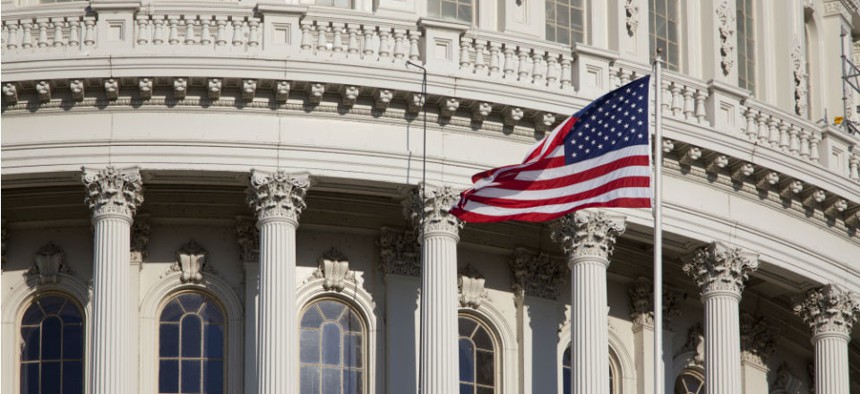
Dave Newman / Shutterstock.com
Fight Brews Over How Long a Shutdown-Avoiding Measure Should Last
Some want all 2015 spending issues to be pushed into the next Congress.
Unexpected drama is emerging over a bill that Congress must pass to keep the federal government funded beyond the Oct. 1 start of its new fiscal year, and it could throw a wrench into what is intended to be only a brief return to Washington for lawmakers next month amid their reelection campaigns.
This fight isn't about the necessity of doing such a continuing budget resolution to avoid another government shutdown, or even how much spending it should contain.
Rather, this battle is over how long such a temporary spending bill should last—and it is being fueled by uncertainty over whether Democrats will maintain control of the Senate after the Nov. 4 elections.
Some House Republicans—hopeful their party will take over the Senate majority—are now privately hedging on whether they should go along in September with passage of a continuing resolution that would expire in December, rather than some later date in 2015. If pushed into next year, the GOP then might control both chambers and Democrats would have less leverage in passing a new budget bill.
"This could lead into a real standoff," said one senior House GOP leadership aide, adding that Democrats are unlikely to go along with extending the CR into next year, and a new Congress.
The House is scheduled to return to session on Sept. 8 for 10 days of legislative work next month and two days in October, when they then break for good until after the election. Senate Majority Leader Harry Reid has said senators will be in session through Sept. 23, but will also be working on the weekends.
It has become clear that Congress will have to pass some type of stopgap spending bill to keep government open past Oct. 1, and the CR will most likely extend current funding levels. None of the 12 annual appropriations bills for federal agencies has yet passed in versions agreed upon by both chambers. In fact, the Senate has yet to pass even one of those bills.
Before the current recess, many lawmakers on both sides of the aisle were predicting that a CR would likely be passed in September, and most said it would extend funding through Dec. 15. Even House Speaker John Boehner told reporters during a news conference in late July that a stopgap bill would probably be written to expire in early December, when Congress is expected to be back for its lame-duck session.
A spokesman for Boehner did not respond on Wednesday when asked whether the speaker and other House Republicans are now considering whether to push for an expiration date in 2015. Likewise a Reid spokesman did not comment on whether Senate Democrats would demand an expiration date before the new Congress takes office.
But other aides confirm that some Republicans are now focusing on the fact that a Dec. 15 expiration date would provide the current Senate Democratic majority one more opportunity to block Republicans from amending the spending bill for fiscal 2015.
All of this hand-wringing, of course, comes despite earlier hopes for budget comity that had been raised after a two-year deal was crafted by GOP Rep. Paul Ryan and Democratic Sen. Patty Murray last year. The deal that Congress enacted established spending levels—a usual source of much of the House and Senate fiscal friction—for 2015.
The two-year accord sets the budget at $1.014 trillion for fiscal 2015, up from $1.012 trillion this year. (Those figures do not include mandated spending on entitlement programs.) The assumption was that those agreements would kick-start House and Senate action in passing the 12 annual spending bills. But that has not happened. As a result, a CR is under development, though details of what it contains have not been publicly released.
A House Republican aide said Wednesday there is a good chance at least two unrelated items will be attached to what otherwise would be a "clean" CR.
One of those items would be a temporary renewal of the Export-Import Bank that will see its existing authorization expire on Sept. 30. Although many conservatives criticize the bank that provides loans to support U.S. export sales as meddling in the market and a risk to taxpayers, a decision to extend its authority for six months, or some other short term, would allow lawmakers to continue hashing that out after the election.
Temporary renewal of the federal backstop for terrorism insurance—due to expire at the end of the year—is another item that may be attached to a stopgap spending bill. That would allow more time for differences between a Senate bill and the demands for changes by House conservatives to be ironed out.







